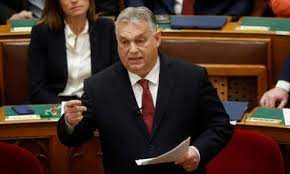Orbán has plenty more chances to play havoc with EU decision-making

Brussels: In the end, he folded when everybody thought he would dig in … and dug in when everybody thought he would fold. Either way, Viktor Orbán has left himself plenty of opportunities to continue playing havoc with EU decision-making.
For weeks before this week’s summit, Hungary’s illiberal, nationalist prime minister had sworn to block EU plans to open accession talks with Kyiv. Admitting Ukraine to the bloc would have huge consequences, he said. Starting the process now would be “a terrible mistake”.
Diplomats and leaders were braced for 48 hours of fraught negotiations over enlargement – and unsure of winning. There was more optimism over the summit’s other main aim: agreeing to another €50bn (£43bn) in aid for Ukraine.
But to EU watchers’ genuine surprise, in the early hours of Wednesday the bloc’s 26 other leaders took the historic step of agreeing to start accession negotiations with a country at war, bypassing Orbán’s objections by asking him to leave the room.
The procedural pirouette, arranged by the German chancellor, Olaf Scholz, allowed the union to approve the start of talks with Ukraine and Moldova with the necessary unanimity, since EU rules require only that unanimous decisions not be opposed.
While Ukraine’s president, Volodymyr Zelenskiy, hailed the unexpected agreement as a victory for Ukraine and Europe, observers remained puzzled. “Very, very, very surprised,” said Mujtaba Rahman, of the Eurasia Group risk analysis consultancy.
Rahman said on X he had fully expected Orbán to stick: vetoing the accession talks in the hope that his leverage for unblocking billions of euros of EU funding for Hungary, which has been frozen over rule-of-law disputes with Brussels, was only likely to increase next year.
Critics have long accused Orbán of holding EU backing for Kyiv hostage to force the money’s release, and elections last month in the Netherlands and next year in Austria could result in more EU countries being led by hard-right governments that share his nationalist views.
Some observers suggested the European Commission’s decision to unblock €10bn of the frozen funds this week – in what critics considered a last-minute concession to Budapest’s blackmail – may have helped sway Orbán’s decision to fold.
But that had been expected for many months – and €21bn more earmarked for Hungary remains out of reach pending Budapest’s completion of numerous other rule-of-law reforms. In the event, Orbán himself made his strategy plain.
Hours after declining to use his veto to block the accession talks, he exercised it to scupper a plan backed by the 26 other member states to revamp the EU budget and channel an extra €50bn of desperately needed aid to Ukraine.
Leaders talked until past 2am seeking to convince Orbán to agree to the package, part of a boost to the bloc’s overall budget, with the Hungarian prime minister resisting last-ditch efforts by the leaders of Germany, France, Italy, Spain and the Netherlands.
He said: “I’ve always said that if someone wants to amend the budget law, this is a great opportunity for Hungary to make it clear it should get what it is entitled to. Not half, or a quarter, but the whole thing.” Budget talks will now resume in January.
Orbán also stressed that unlike the budget discussions, the accession negotiations would be long, and that Hungary could still block them at any time. Budapest had “nothing to lose” by not vetoing the start of membership talks with Kyiv, he said. It could do so later.
“This was a bad decision,” Orbán said. “I didn’t want Hungary to have that on our conscience, so I left the room.” The final word on Ukraine’s accession must come from member states’ national parliaments, he noted. “All 27 of them – including the Hungarian one.”
Budapest, he calculated, would have about 75 occasions between now and Ukraine’s full membership to halt the process, and would not hesitate to “pull the handbrake” before Hungarians paid for any consequences.
Some observers saw upsides to the summit’s mixed outcome. History would record, they said, that Orbán had caved on a decision of real geopolitical consequence. Even if they had lost the short-term economic battle – which should be considerably easier to fix – the 26 had won the bigger political one, and sent a vital signal to Ukraine,
“Not to be underestimated: nobody among the other 26 broke ranks, and Orbán beat a tactical retreat after testing the cracks, and once the costs of his ‘solo position’ became too high,” said Milan Nic, of the German Council on Foreign Relations.
Others were less sure. “From a realpolitik perspective, this was a cynical but rational move” by Orbán, suggested Nicolai von Ondarza of the German Institute for International and Security Affairs.
“Opening up accession negotiations is symbolic, but only the start of a process that leaves many options for vetoes. Blocking the money, on the other hand, will hurt Ukraine’s efforts directly – even if the 26 might find a way around it.”
R Daniel Keleman, a public policy specialist at Georgetown University and long-time critic of Brussels’ approach to Hungary, was even more scathing. “Orbán extorted the EU for €10.2bn, and still vetoed Ukraine aid,” he said on X.
This was the Hungarian leader “helping his friend Putin’s war on Ukraine”, he said, adding: “He let accession talks start, but those will take many years – and he will have many chances to veto progress or extort the EU for more cash.”





